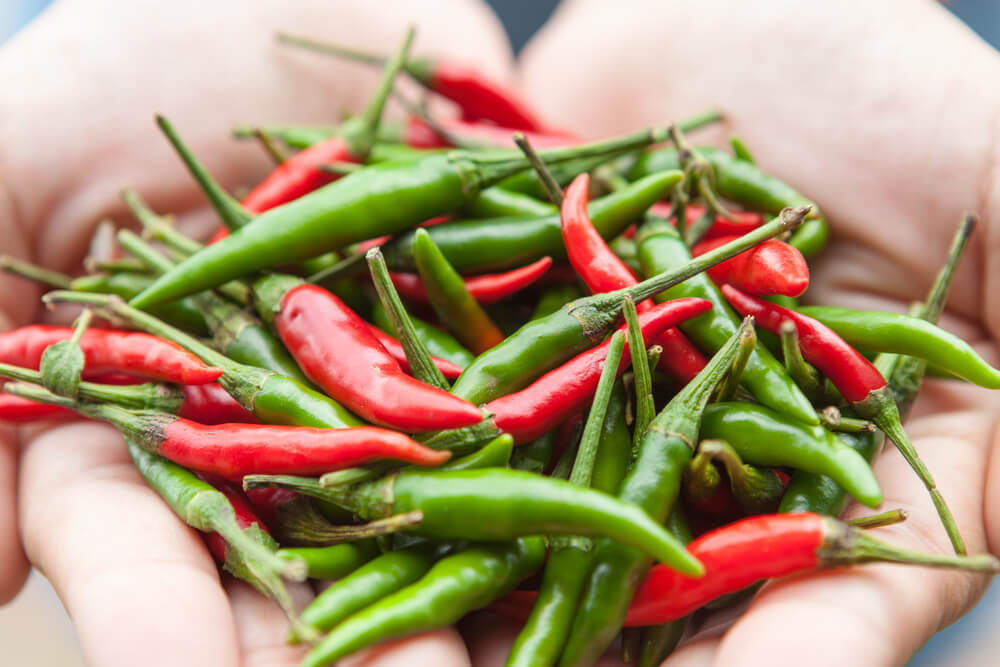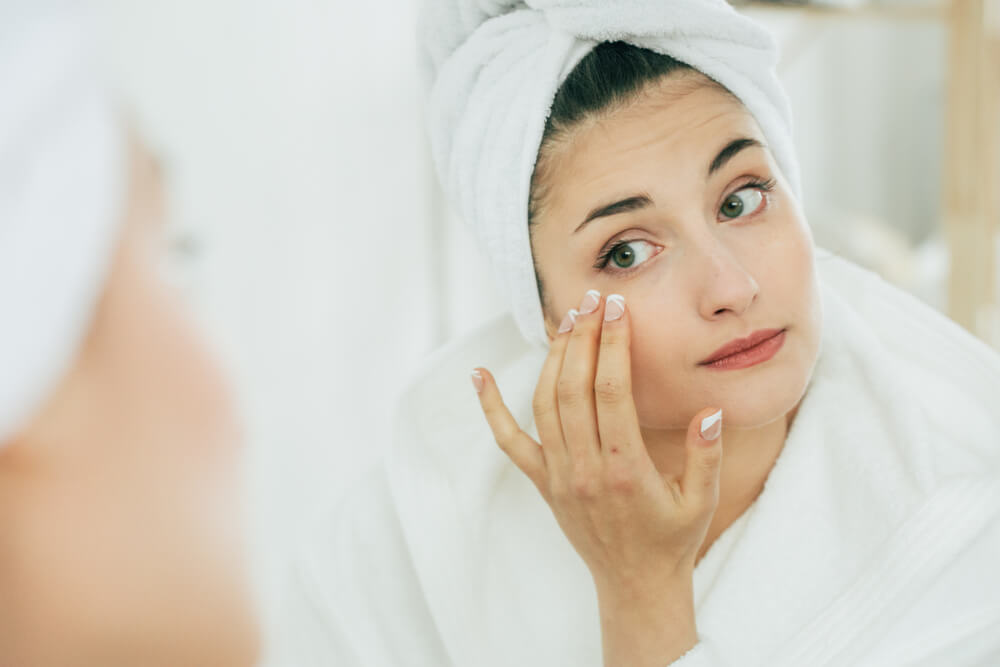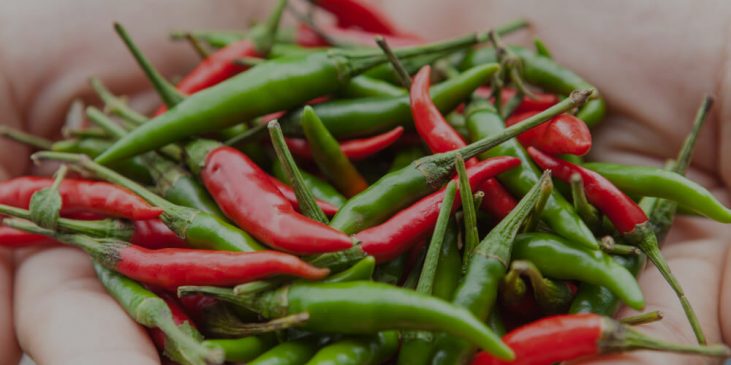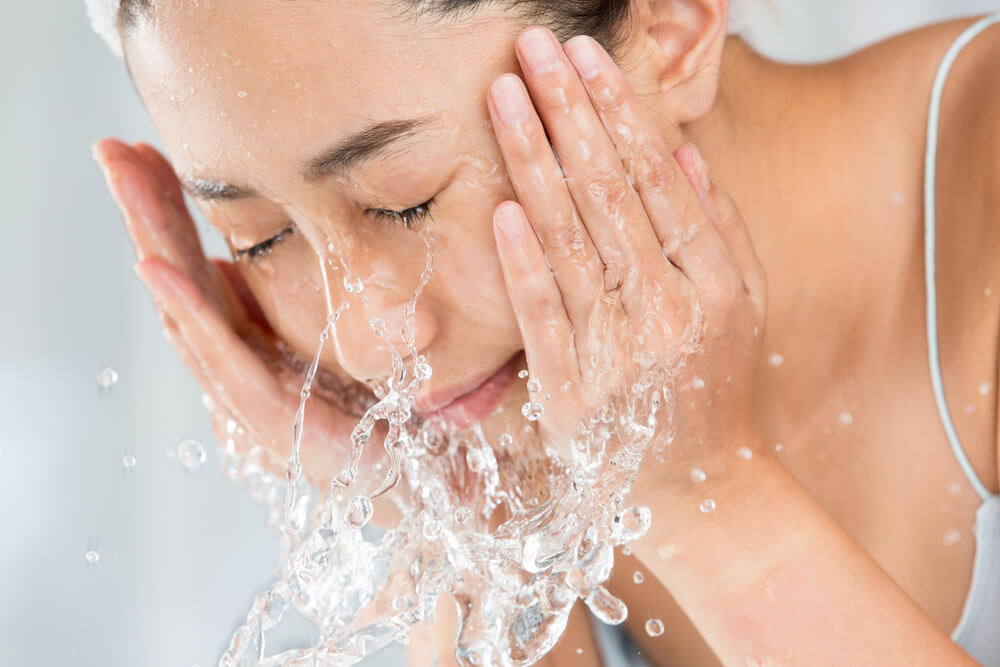“Is this sunscreen good for me?”
“Does anti-aging cream work to reduce wrinkles?”
These are questions that often come to mind when thinking about skincare. It’s common knowledge that what goes on, and therefore in, your skin matters. However, have you ever thought about what goes into your body and how it affects your skin? Food is also a factor for healthy skin.
Is Spicy Food Bad for Your Skin?

No one magic food or ingredient helps you get porcelain skin. However, there are foods we can avoid to prevent breakouts. For example, spicy food.
To be clear, it’s not the food itself that triggers your acne or other skin problems. However, it can increase the chances of breakouts, mainly if you’re not used to such eating spicy food.
Spicy food is not a trigger for everyone. However, you should take note of this if you have sensitive skin:
According to research, young females were found to be more at risk for acne. The research studied the risk factors of acne vulgaris among females. It found that 58% of women who ate spicy food experienced having blackheads.
Specifically, the side effects that you can experience after consuming spicy food can up your chances of having various skin problems.
We often associate fire and heat with spicy food, and for a good reason!
After a spicy meal, your body heats up. It produces sweat which triggers oil to be released from your skin. When oil, dirt, and bacteria clog up your pores, that’s when you can find yourself having trouble with various skin conditions.
How Does Spicy Food Affect Skin?
Spicy food can increase inflammation in the skin, especially when you’re not used to eating it. Inflammation is one of the defensive bodily functions we have. It is triggered when the immune system recognizes foreign invaders like bacteria, parasites, and other substances that may be harmful.
So then, isn’t inflammation a normal bodily reaction?
It is! However, it can be problematic when the body mistakenly identifies innocuous substances as harmful. This reaction from the defense systems of the body prolongs the inflammatory response and causes various effects. As a result, this prolonged inflammation typically causes the adverse effects of spicy food on the skin.
If you’re sensitive to spicy foods, you would know from experiencing these:
Broken Capillaries or Spider Veins
Broken capillaries or “spider veins” occur when blood vessels beneath the surface of your skin dilate and enlarge. Inflammation causes the dilation of blood vessels.
Spider veins look like red lines that form a web-like shape. Spider veins commonly occur on the face and the legs. Having broken capillaries is often harmless. If you care about having clear skin, though, having spider veins can be a nuisance.
Acne
Acne happens when hair follicles get clogged with oil and dead skin cells. Blackheads, whiteheads, and pimples are other symptoms of acne.
Inflammation triggers the overproduction of sebum. Adolescent acne largely correlates with genetic dispositions. Additional environmental factors can contribute to acne’s onset, particularly, skin oiliness. Examples are stress and diet. Further studies also show a clear and significant link between oily skin and the ingestion of spicy food.
Flushing
Flushing appears as redness of the skin. Flushing happens when blood vessels below the skin dilate and fill with more blood. Body heat is a primary proponent of flushing.
Asian flush is a physiological reaction common to Asians when drinking alcohol. Spicy food increases body heat which in turn causes redness and flushing.
Rosacea
One common skin condition is rosacea. It causes visible blood vessels and redness, usually on the face. Rosacea also produces small, red, pus-filled bumps in the affected area. Breakouts can occur for weeks and disappear for a while. Spicy food is attributed as a contributor to these breakouts.
How Do You Maintain Clear Skin Without Totally Sacrificing Spicy Foods from Your Diet?

There’s no need to be alarmed if you’re a fiery food veteran! You may experience no adverse effects even if you regularly eat spicy food. This way, you shouldn’t bother too much about having a drastic change in diet.
Otherwise, consider having a change in diet and lessen your spicy food intake. You may do this if you have sensitive skin or maintain flawless skin. Cheat days are fine if you’re an avid fan of spicy food. Though, you may be at risk of a breakout and redness after your spicy treat.
What Other Food Choices Should You Avoid to Prevent Skin Problems?
Again, the food itself is not a trigger to having breakouts and flare-ups. However, it can be a contributing factor to these skin problems if you have sensitive skin. In addition to food, here are some you should avoid having in your diet that’s optimized for skincare:
Dairy
Several clinical studies show a link between the consumption of dairy and acne. Dairy sources contain hormones. Milk naturally functions as a growth stimulant, thereby preventing hormones. The presence of 5–alpha–pregnanedione, 5–alpha–androstanedione, and other 5-alpha–dihydrotestosterone precursors are substances that may induce acne.
Sugar
A diet that contains lots of sugar includes high caloric meals filled with carbohydrates. This diet can contribute to the onset of acne and skin oiliness. Studies also show that a high carb diet increases the frequency of acne onset.
Salty Food
A particular study assessed the link between acne and salty and spicy food. It found that these foods factor in the development of acne. Consumption of these foods, particularly salty food, was higher among patients with acne.
Greasy Food
The way food is prepared matters. Food preparation affects your food’s caloric value and can be affected by how food is prepared.
For instance, greasy and oily food can contribute to having oily skin. Greasy food is often served at fast-food joints. Clogged pores and hair follicles are what cause the eruption of acne. Be especially careful about getting grease on your fingers and touching your face after. These can clog your pores.
Gluten
High-glycemic foods were found to have a link with acne. This is most likely caused by the high levels of insulin produced by these foods. Insulin is a hormone that promotes inflammation. It subsequently results in acne.
Foods You’re Allergic To
Allergies are highly individualized and vary from person to person. It is essential to know what you’re allergic to so that you can maintain clear skin. Allergies can manifest in various ways. A common way it manifests is through rashes and flushing. Part of keeping a healthy diet is knowing your allergies. The healthier your diet is, the more radiant your skin will be.
An Important Note on Moderation
You need to practice moderation to maintain a healthy diet. A viable and sustainable way of eating a healthy diet is practicing moderation in terms of the servings of the food you eat. While spicy food and other types of food like the ones indicated above aren’t inherently bad, over-consumption can result in adverse effects.
What Can I Do About a Breakout?
Wash your face
Eating spicy food may cause your face to sweat. Wiping your sweat away and washing your face after helps remove excess oils from the skin.
Are you prone to acne and feeling the urge to over-cleanse?
Don’t!
A recent study found that excessive scrubbing and face-washing may irritate and exacerbate skin conditions. Instead of helping with the adverse effects of spicy food, over-cleansing will only aggravate your sebaceous glands.
After more than 3 washes, you remove the natural oils, causing dry and itchy skin. Bacteria and other dirt can enter through cracked and dry skin. Keeping natural and healthy oil in your body is vital to prevent breakouts and other skin conditions. You can wash your face 2 to 3 times a day to cleanse moderately.
Build Your Tolerance
If you always have a breakout but don’t want to take out spicy food from your diet, you can build your spice tolerance. You can start by acclimating yourself to the lower levels of the pepper scale.
Start with mild peppers first. You should first adapt to milder variants like the Poblano and Bell Pepper. Then, you can opt for adding medium heat peppers like the jalapeno. Turn up the heat once you’ve gotten used to medium heat chilies! By acclimating to chilies, your body can be less susceptible to negative reactions toward these foods.
Change Your Diet with Alternatives
You may decide that the heat is something you can live without in your diet. If so, you may opt for better diet alternatives for your skin. These can help maintain your youthful and clear glow. Some foods that you can enjoy for better skin are:
- Fruits and vegetables: Fruits and vegetables are full of vitamins and minerals. They have anti-inflammatory effects that make them great for countering the inflammation caused by spicy food.
- Anti-inflammatory fats: Omega-3 and Omega-6 fatty acids also have anti-inflammatory properties. You can get Omega-3 fatty acids in fish like sardines and salmon. Omega-6 fatty acids, on the other hand, are in seeds and nuts. Chia seeds, sunflower seeds, almonds, and walnuts are excellent sources of Omega-6 fatty acids and nutrients.
- Probiotics: As long as you’re not lactose intolerant or sensitive to dairy, you can load up on food rich with probiotics like yogurt and milk. If not, taking a supplement can be an alternative. Remember to consume a moderate amount of dairy products. They may cause adverse effects on your skin when consumed in excess.
- Tea: Matcha or green tea helps boost your chances of having clear skin. Both are high in antioxidants. They also fight stress, a common contributing factor to having bad skin. Make chamomile or mint tea to relieve stress.
- Fennel: Being a food rich in antioxidants, fennel can help protect your skin from fine lines and wrinkles.
- Ginger: Ginger is rich in antioxidants. It is a good source of nutrients. Additionally, it helps flush out toxins and stimulates blood circulation. Eating foods with ginger can help promote tauter and firmer-looking skin because it reduces damage caused by free radicals.
- Water-rich foods: Hydration is essential for maintaining great skin. Make sure to always get enough water per day. You can also incorporate water-rich foods in your diet like cucumbers, watermelon, and pineapple.
Use Skincare Products That Soothe the Feel of Your Skin
If your skin is feeling irritated, use products that soothe the look of inflammation.
- Lavelier Skin Clair Repair can help to alleviate the appearance of skin discoloration and hyperpigmentation. This way, you can have a brighter-looking complexion and more radiant skin.
- To rejuvenate and smoothen the look of your skin, you can use Lavelier’s Seagrass Phyto Silk.
- Boost your skin with a rich solution with Lavelier’s Blue Algae Beauty Skincare Duo.
- Lavelier’s Nano Gold Serum has a powerhouse combination of ingredients to hydrate and soothe the feel of your skin, such as aloe vera extract and green tea extract.
What’s The Bottom Line?
Spicy food itself does not cause acne and other skin problems. However, there is a correlation between spicy food and having bad skin.
Our body’s reaction to spicy food contributes to various skin problems or aggravates pre-existing conditions. It is essential to know if you’re sensitive to the effects of spicy food. Those who have sensitive skin are more likely to feel the harmful effects of eating spicy food.
Changing your diet and avoiding spicy foods is an option. However, it’s not an option that fans of the heat are willing to take. Luckily, there are ways to care for your skin while still having that occasional spicy treat. Building tolerance and maintaining a healthy skincare regimen help counteract spicy food’s adverse effects on your skin.




0 comments on “Is Spicy Food Bad for Your Skin?”